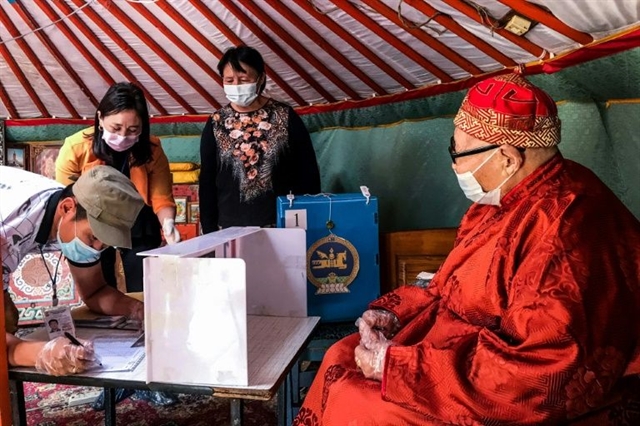 World
World

Mongolians headed to the polls on Wednesday with a host of coronavirus safety restrictions in place as debate raged over whether the elections should have been postponed.

|
| People cast ballot in Ulan Bator. — AFP/VNA Photo |
ULAN BATOR — Mongolians headed to the polls on Wednesday with a host of coronavirus safety restrictions in place as debate raged over whether the elections should have been postponed.
The landlocked East Asian country has seen candidates flout lockdown rules during campaigning and thousands of people stranded overseas by closed borders left unable to vote.
A multitude of safety measures were imposed as polling stations opened early on Wednesday.
Voters queued two metres apart to enter, with medical staff checking temperatures, passing out hand disinfectant and masks, and providing single-use plastic gloves to fill out ballot papers.
Tsetsegee Tsetsendalai, 71, the first voter to enter a polling station in the Sukhbaatar district of the capital Ulan Bator, said the country was right to go ahead with the election, calling the outbreak not so serious.
"Other countries already organised elections even if there is a pandemic," she told AFP.
Mongolia, with a population of three million, has imposed some of the world's toughest measures to contain the virus and was among the first countries to close its borders.
About 8,000 Mongolians are currently stranded abroad and protests inside the country calling for their return have been broken up by authorities on the grounds that they break social distancing rules.
There have only been about 200 reported coronavirus cases in Mongolia – most imported from Russia – and no confirmed fatalities.
"I thought the election should be delayed," argued another voter,39-year-old Enkhtsetseg Bandi.
"However, the state is spending billions to organise this election, so I must participate not to waste our budget."
The country's two main political parties have broken bans on gatherings of more than 30 people by holding big campaign rallies and ignoring social distancing rules.
A number of corruption scandals have erupted in recent years and there is growing anxiety about graft in the young democracy, which ended decades as a Soviet satellite in 1990.
Enkhzaya Sodnomtseren, a 32-year-old mother-of-two, said she wanted the elections so a fresh round of lawmakers could be brought to power.
"I truly believe we must hold the election, no matter what happens," she said. "I was super happy and in a hurry to come here to vote because I want change." AFP




